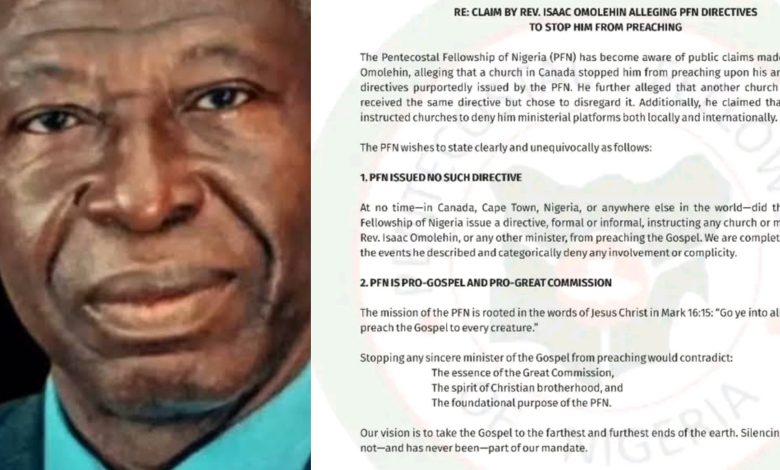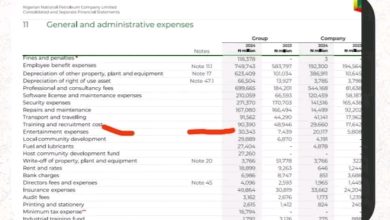Preaching Ban Controversy: PFN Denies Secret Directives as Omolehin’s Claims Rock Pentecostal Circle

By Passman Akpos
Uyo/Abuja, Nigeria — The Pentecostal Fellowship of Nigeria (PFN) has firmly denied claims by veteran cleric Rev. Isaac Omolehin alleging that the body issued directives to churches in Canada, Cape Town, and Nigeria instructing them to prevent him from preaching. The allegations, which went viral over the weekend, have stirred intense debate across Nigeria’s Christian community and social media platforms.
In a detailed statement signed by the PFN National Publicity Secretary, Dr. Sylvanus Ukafia, the organisation described the allegations as “completely unfounded,” stressing that it has never issued any directive—formal or informal—restricting Rev. Omolehin or any minister from preaching.
PFN: “We Never Stopped Rev. Isaac or Any Minister From Preaching”
The Fellowship categorically distanced itself from the events described by Rev. Omolehin.
> “At no time—in Canada, Cape Town, Nigeria, or anywhere else—did the PFN instruct any church or minister to stop Rev. Isaac Omolehin or any other minister from preaching the Gospel,”the statement read.
PFN said it had no prior knowledge of the alleged incidents and maintained that it neither interferes with preacher invitations nor issues exclusionary directives to any local or international ministry.
Allegations of a ‘Pentecostal Cabal’ Spark Outrage
Rev. Omolehin’s emotional testimony—shared widely online—painted a troubling picture of what he described as a powerful “Pentecostal cabal” blocking his ministry engagements. The cleric narrated that he spent ₦16 million to personally fund a trip to Canada, only to be told upon arrival that he would not be allowed to preach because:
> “There was an instruction from Nigeria not to allow me preach.”
He also alleged that another church in Cape Town received a similar directive but refused to enforce it.
The claims have triggered heated reactions across social media, with supporters accusing top-tier Pentecostal leaders of gatekeeping, internal politics, and “godfatherism.”
One commentator lamented:
> “Ministry is now like a cult. If you’re not in their camp, you become a target.”
Another added:
> “We have very few genuine men of God; the rest are businessmen.”
PFN Reaffirms Its Commitment to the Great Commission
In its statement, the PFN reiterated that its mandate is rooted in Mark 16:15—to take the Gospel to all creatures—and therefore would never restrict a genuine minister of the Gospel.
The Fellowship said such alleged actions would be contrary to:
The essence of the Great Commission
The spirit of Christian unity
The mission of taking the Gospel to the ends of the earth
> “Silencing a preacher is not—and has never been—part of our mandate,”the PFN declared.
PFN Demands Evidence From Rev. Omolehin
To ensure transparency, the PFN has invited Rev. Omolehin to provide verifiable evidence that links the organisation to the alleged restrictions. The Fellowship requested
Names of the churches involved
Identities of individuals who purportedly issued directive
Any written, audio, or video proof
The PFN stated that it is willing to investigate any credible information presented.
‘Biblical Protocol Was Ignored,’ PFN Says
The organisation expressed concern that Rev. Omolehin took the matter public without first seeking clarification from PFN leadership, citing Matthew 18:15, which encourages private resolution of conflicts among believers.
> “A simple inquiry would have dispelled this misinformation,”the statement added.
PFN Extends Goodwill to Rev. Omolehin
Despite the dispute, the Fellowship described Rev. Omolehin as “a fellow labourer in the vineyard of Christ” and wished him grace and strength as he continues his ministry.
Churches Urged to Keep Pulpits Open
The PFN encouraged churches in Nigeria, Canada, South Africa, and globally to maintain open platforms for sincere ministers, promoting unity and advancing the Gospel without borders.
A Deepening Rift or a Call for Reform?
The controversy has reignited broader conversations about:
Transparency in church leadership
Alleged internal politics in Nigerian Pentecostalism
The influence of powerful blocs within the ministry
The need for accountability among Christian organisations
Some Christians argue that the uproar reflects long-standing tensions, now amplified by social media.“This practice has been on for decades. Social media is only making it harder to hide,” one user wrote.
Others see the moment as an opportunity for reform, calling for more openness and less centralised influence in ministry networks.
PFN Reaffirms Its Stand
The Fellowship concluded its statement by emphasising its dedication to:
Unity in the Body of Christ
Evangelism without borders
Truth, transparency, and Christian love
It “categorically rejects and refutes” the suggestion that it attempted to hinder Rev. Omolehin’s preaching or that of any other minister.
The official statement was issued from the Office of the National Publicity Secretary, #227 Nsikak Eduok Avenue, Uyo, Akwa Ibom State.





